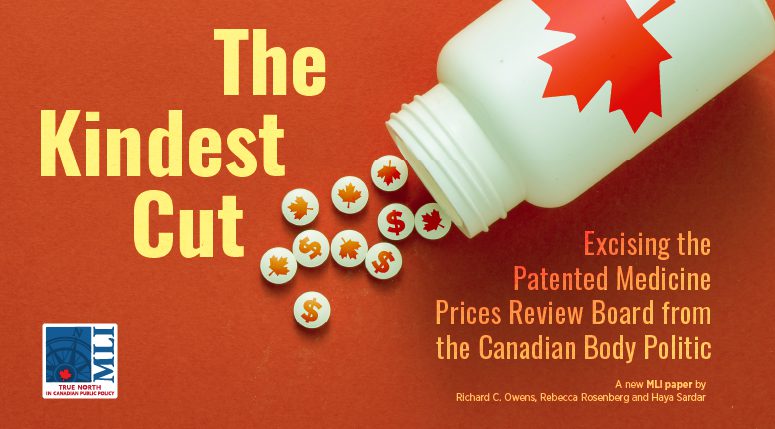OTTAWA, ON (June 2, 2022): The PMPRB, a regulatory body formed in 1987, was never a principled policy initiative targeted to address any actual harm. Rather, it was meant to placate opposition to the passage of much-needed intellectual property (IP) law reforms. Medical science has changed dramatically since then; the PMPRB has not.
In the latest MLI paper, titled “The kindest cut: Excising the Patented Medicine Prices Review Board from the Canadian body politic,” Munk Senior Fellow Richard C. Owens, Rebecca Rosenberg, and Haya Sardar evaluate the policy of drug price controls, their constitutionality, and the effect they have on access to medication and medical innovation.
They argue that the PMPRB lacks a constitutional foundation. The federal government may have the power to correct or penalize patent abuse, but the PMPRB does not address patent abuse. Instead, the PMPRB’s actions amount to industrial price controls, which are a provincial rather than a federal power.
“The compliance rate with PMPRB pricing regulations has fluctuated between 90 and 95 percent over the last 15 years,” argue the authors. “Those companies that are deemed to be pricing their drugs excessively usually undertake voluntary compliance.”
The authors also assert that Canada’s control of drug prices springs out of naive fear of the pricing power afforded by those drugs’ patents. This is profoundly misleading: it implies that the drug is a public good over which an unentitled actor has acquired a market monopoly – rather than being an entitlement to market a widely beneficial invention.
“[P]atents do not grant an exclusive right to serve or supply a market demand (e.g., treatment for a particular disease),” write the authors. Instead, they “merely temporarily prohibit the unfair competitive use of a specific novel means – usually among many – of serving that market.”
The federal government had attempted to modernize its drug price regime through its New Regulations, which would have given the PMPRB sweeping new powers over pricing rules. Fortunately, the government has withdrawn portions of these amendments specifically found to be unconstitutional. Yet their replacements have yet to be released.
Instead, the government needs to more radically reform its drug pricing policy. First, it should rescind the New Regulations in their entirety; these poorly thought out amendments would have only dragged Canadian drug pricing policy backward. Second, it should phase out the PMPRB completely while simultaneously working to abolish drug price controls at the international level and improving access to new drugs by adopting foreign drug registration reviews. Hopefully, this will reverse the trend of declining registrations of new medicines, departing companies, and lack of research investment in Canada.
“It is time for Canada to unequivocally commit to building an innovation ecosystem. Coercion and horse-trading under industrial policy are wasteful, ineffective measures for economic growth and innovation,” conclude Owens, Rosenberg, and Sardar.
“We must create favourable conditions for R&D investment in Canada – principally better IP protection, no price controls, lower taxes (especially on capital gains), and quicker market uptake of products – if we are to have economic growth and innovation in life sciences in the 21st century.”
To read the full paper, click the button below.

***
Richard C. Owens is a Munk Senior Fellow with the Macdonald-Laurier Institute and a lawyer who has specialized in business and commercial law, regulation of financial institutions, intellectual property and technology. Rebecca Rosenberg is currently pursuing a J.D at the University of Toronto Faculty of Law. Haya Sardar is a 2nd year law student at the University of Toronto.
For more information, media are invited to contact:
Skander Belouizdad
Communications Officer
613-482-8327 x111
skander.belouizdad@macdonaldlaurier.ca





